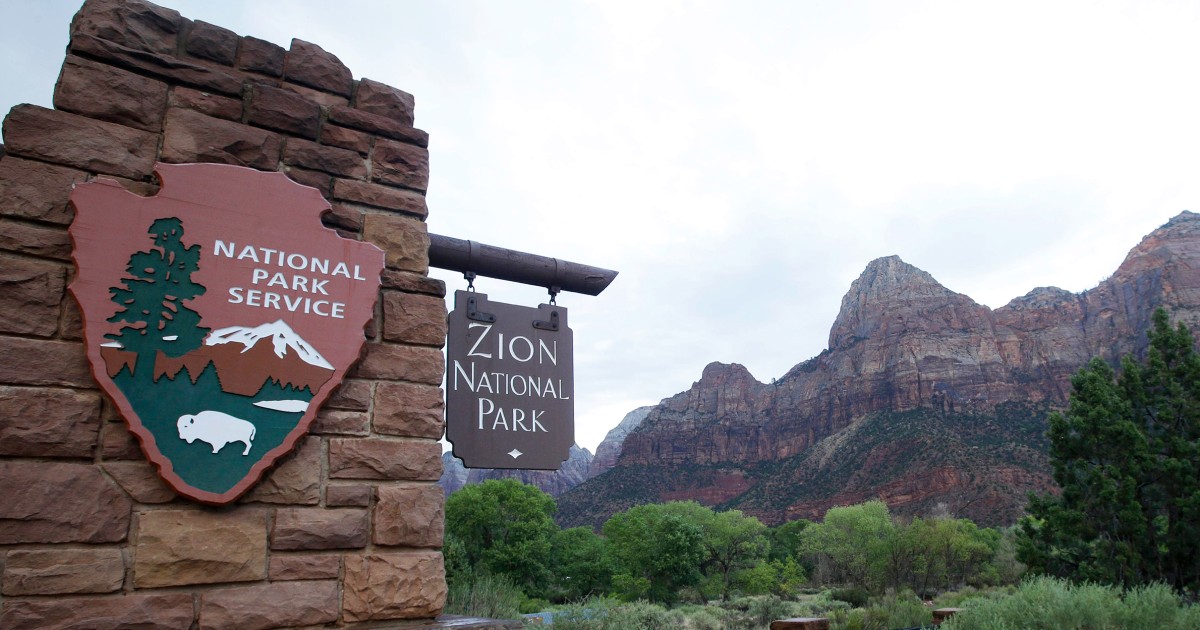
With the government shutdown about to extend into a second week, some governors are drawing on state funds to ensure popular national parks remain open for visitors.
Utah and West Virginia said they already have funding streams to keep places like the Zion and New River Gorge parks operational. Tennessee is playing a role in helping keep Great Smoky Mountains National Park open, while Colorado is eying similar steps for some of the National Park Service attractions in its state.
The Interior Department issued guidance last week allowing open-air sites at parks to remain open during the shutdown, but indoor structures like visitor centers would be closed to the public. Nearly 64% of the National Park Service’s 14,500 employees are expected to be furloughed amid the funding lapse.
Here’s how some states are handling the situation a week into the shutdown.
Utah
Utah is providing “dedicated funds” to keep its five national parks open, the state Tourism Office said in a release Friday.
The money is coming from the Governor’s Office of Economic Opportunity and will cover visitor center operating expenses at Utah’s “Mighty 5” parks, which include Zion and Bryce Canyon, and Cedar Breaks National Monument.
The state said its five national parks average 37,000 visitors a day in October.
Natalie Randall, managing director of the Tourism Office, indicated in an email Monday that the state was covering the estimated $8,000 a day it cost to operate the visitor centers at Utah’s parks.
Tourism Office spokesperson Anna Loughridge said Utah will not be reimbursed for that spending. Asked how long the state could cover those costs, Loughridge said in an email the state is “in close contact” with the national parks and “will continue to reevaluate.”
The state has the third most national parks, after California and Alaska.
West Virginia
West Virginia Gov. Patrick Morrisey, a Republican, last week announced a donation agreement of nearly $100,000 to keep the state’s national parks fully operational.
The news release Thursday mentioned park visitor centers closing and said Morrisey “authorized resources to restore those services.”
The state agreed to donate $97,986.56 in an agreement with the National Park Service, Drew Galang, Morrisey’s deputy press secretary, said Monday. The donation would go toward keeping New River Gorge National Park and Preserve and Harpers Ferry National Historic Park fully operational for 14 days.
Galang said that NPS approved the donation agreement and that the state’s parks are “fully operational at this time.” West Virginia will not be reimbursed for its donation, Galang said, but if the shutdown lasts less than 14 days, the state will get back any unused funds from the original donation.
Tennessee
Sevier County in Tennessee said it has partnered with a number of organizations to keep Great Smoky Mountains National Park open amid the shutdown.
The county said it’s working with cities, towns and counties, the state of Tennessee, a nonprofit group dedicated to the Smokies and the Eastern Band of Cherokee Indians to provide nearly $62,000 a day to “ensure full operations” at the state’s only national park.
Sevier County spokesperson Tyler Basler said in an email Monday that October was the second-busiest month of park visitation, calling it “crucial” to keep it fully operational.
In a news release announcing the efforts, County Mayor Larry Waters said it was “disappointing that the federal government has once again failed to prevent a shutdown that puts our national parks and communities at risk.”
“Thankfully, our state and local partners have stepped up once again to ensure the Great Smoky Mountains National Park remains open. The park is a vital part of our regional economy, and closing it during peak fall season is simply not an option,” said Waters, a member of the Sevier County Republican Party executive committee.
Basler said the county has helped keep the park open during past shutdowns, adding that the county “has been reimbursed the amount that was used to fund the park.” He said the federal government had reimbursed the county in the past.
Colorado
Gov. Jared Polis, a Democrat, last week indicated a willingness to help keep Colorado’s parks open during the shutdown.
Polis urged the Trump administration to prioritize park service operations to ensure they’re open and indicated that the state is willing to spend money on that front.
“I have repeatedly called on the federal government to keep National Parks open, especially during the busy fall tourism season. The state is offering support to keep Colorado’s iconic National Parks open for Coloradans and visitors as we continue to monitor for next steps,” Polis said in a statement last Wednesday, the day the shutdown began.
‘A patchwork solution’
The push to keep national parks open as usual during the shutdown has met resistance from the National Parks Conservation Association, a nonprofit advocacy group that wants the parks to stay fully closed during this period.
The group said that there is precedent for states’ tapping into their funds to keep parks open — but that keeping parks open during shutdowns has generally led to natural resource destruction.
Senior Vice President of Government Affairs Kristen Brengel said in an interview that state and local governments’ providing resources is not a substitute for fully funding parks.
“This is a patchwork solution to a big problem,” Brengel said.
She added that states’ funding park operations is “not a great solution to keeping parks open during a shutdown, because damage can absolutely happen to the resources during a shutdown, because you will not have the full complement of staff that you need to run the parks.”
“Even though you do these state agreements, you still have to cross your fingers and hope nothing happens,” Brengel added.
“The weight of these closures are going to put pressure on senators and members of Congress. There are people who are furious about the parks being closed right now across the country, and they know it. They’re hearing from them,” she said.
“On one hand, the states are ponying up the money to keep the parks open, but on the other hand, they also signed a contract that said that they’re not going to get reimbursed for it, so it’s money that they’ll never see again. You get pressure every which way,” she added.
